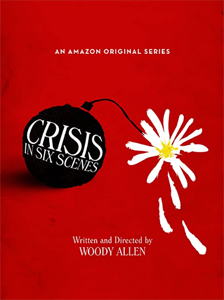For “Crisis in Six Scenes” (2016, Amazon Prime), Woody Allen takes a rolling pin to a movie idea, flattening it out to take up six 23-minute episodes. He openly admitted he struggled with the TV format. But TV can accommodate all kinds of storytelling structures now. So even though this is essentially a longer-than-usual Allen movie, it’s not a bad one.
Back to the Sixties
The padding in this beautifully rendered 1960s story comes from conversations about the Vietnam War, crooked governance and the principles of revolution. These are serious topics, but Allen also wants to make a comedy, so he’s stuck in the middle.
Still, by the final episode when dozens of people converge on the suburban New York household of S.J. and Kay Munsinger (Allen and Elaine May), the farce is earned more than in, say, “What’s New Pussycat.” Kay and her book club of old ladies get swept away by the writings of Karl Marx and Chairman Mao; that’s not something you see every day.

“Crisis in Six Scenes” (2016)
Amazon Prime, 6 episodes
Creator: Woody Allen
Stars: Woody Allen, Elaine May, Miley Cyrus
I appreciate that “Crisis” doesn’t take a binary view of government; it acknowledges the wrongness all around. It lightly criticizes the hypocrisy of revolutionary Lennie (deep-voiced Miley Cyrus), who claims she’s not a communist yet has a huge poster of Che Guevara on her wall.
“Crisis’ ” greatest strength is in re-creating the era. If Rachel Brosnahan’s role here as Ellie — fiancée of Alan (John Magaro), who is smitten with Lennie – helped get her the lead role on “The Marvelous Mrs. Maisel,” this production was worth it. Brosnahan perfectly embodies a young woman of the midcentury.
Octogenarian leads
Her role is small, but everyone here is pretty good. In the opening scenes, I worried that this project was too much for the shoulders of May – who has a unique voice that takes some getting used to – and Allen, who only appeared in one of his 2010s films (“To Rome with Love”).
But hey, the characters are octogenarians just like the actors are. The Munsingers are set in their ways, so it’s fun to see them take on absurdist situations to help Lennie. The only time it flirts with going too far is when they leap across rooftops.
Until the farcical finale, “Crisis’ ” comedic pleasures are small. Kay runs marriage counseling from her home and casually doles out wildly creative solutions such as a husband paying his wife for sex.
S.J. is a TV writer (and a neurotic one, naturally). (Interestingly, Allen was a TV writer around this time in the real world.) He wonders if he has a great novel in him, something Salinger-esque. I wonder if Allen himself was mulling taking a crack at a novel, and channeling that through S.J.

An experiment worth trying
I’m not as hard on “Crisis” as is Allen himself, who called it “a cosmic embarrassment.” Certainly, I can see that he’s stretching a movie idea (that’s how his story ideas come to him, understandably) into a TV miniseries. It could be easily edited into a normal-length movie while retaining the plot.
Even as it stands, it’s easy to watch, with breaks every 23 minutes. Despite the length, this isn’t standard sitcom humor. But we don’t want it to be sitcom humor. Instead, one-liners emerge organically from the mildly bizarre situations and generational and ideological clashes.
“Crisis in Six Scenes” doesn’t sing quite like “Maisel” would do one year later on the same streamer. It’s paced a little too slow, and the themes might naturally be too serious for great comedy. But it’s an amusing experiment that was worth trying.

